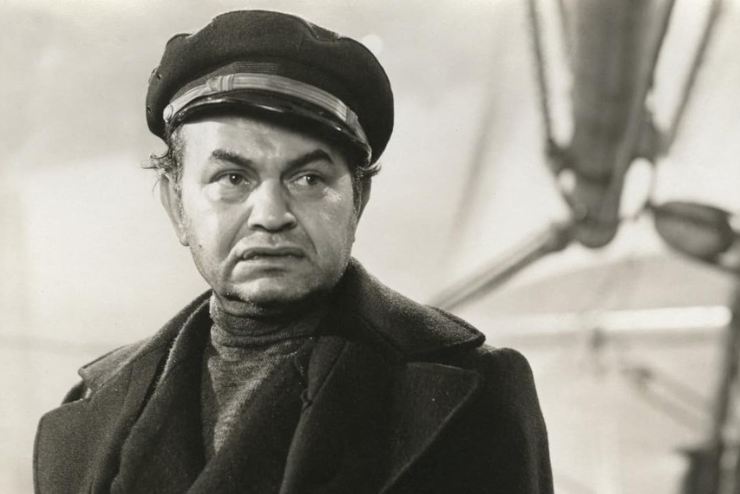Directed by Michael Curtiz ◆ Screenplay by
Robert Rossen, based on a novel by Jack
London ◆ Produced by Hal B. Wallis ◆ Distributed by Warner Bros.
The Sea Wolf (1941) boasts good actors—John Garfield, Edward G. Robinson, Ida Lupino, and Alexander Knox. Moreover, it is a fairly faithful adaptation of Jack London’s 1904 novel.Robert Rossen, a member of the American Communist Party, wrote the screenplay, so it’s inflected with Marxist sentiments throughout. This does not harm the film, however, as London himself was socialist in his politics, if not consistently so. London later quit the Socialist Party, and focused instead on the concept of survival-of-the-fittest racial struggle that he gleaned from reading Herbert Spencer.
Spencer’s influence is more prominent in The Sea Wolf than Marx’s; London wrote it as a panegyric to America’s harsh individualism. He was convinced that Americans were made fitter to survive than other peoples because they were taught from an early age that success required unremitting hard work, endurance, and individualism.
London brought together his Nietzschean superman aspiration with his socialist recognition of human limitations in the person of the merciless ship captain, Wolf Larsen. Larsen bestrides his ship, The Ghost, wielding authority imperiously with little regard for his cringing crew, who have come to hate him even as they submit to his orders, both practical and whimsical.
Edward G. Robinson plays Larson, a willful man who gruffly pushes others about for his amusement. Robinson does a good job playing his character, but his physical presence doesn’t correspond to London’s portrait of a fascist tyrant. The actor who could have played Larson perfectly was Sterling Hayden, a visibly imposing man with a natural snarl betokening his toughness. What’s more, Hayden was devoted to sailing ships both as a sailor and as an owner of one himself. Indeed, Hayden once took his kids on a cross-ocean voyage against the express wishes of a divorce court, which had awarded his ex-wife custody of the children.
Still, Robinson does well as a superman type, with both temperamental and physical disabilities. The works of Milton, Nietzsche, and Spencer are shown on the shelves in his private cabin. In one scene, he opens his copy of Paradise Lost and reads Satan’s boast, “Better to reign in Hell than serve in Heaven.”
When I read London’s novel in high school, I found it quite impressive. I recall paraphrasing a passage in which London expressed his Darwinian and Spencerian enthusiams, boasting that
In our loins are the possibilities of millions of lives. Could we but find time and opportunity and utilize the last bit and every bit of the unborn life that is in us, we could become the fathers of nations and populate continents.
I paraphrased this within earshot of a young lady who promptly told me I was being crude. “Not at all,” I responded. “I was just being excessively Catholic.” She was not mollified by my defense.

Leave a Reply